The vast majority of Americans say it is at least somewhat important to them to have a U.S. president who lives a moral and ethical life (93%), and most also say they want the president to stand up for people with their religious beliefs (69%). Smaller shares want the president to have strong religious beliefs or to share their religious faith – although more than half of Christians say these things are at least somewhat important.
Jews and religiously unaffiliated adults (those who say their religion is atheist, agnostic or “nothing in particular,” also known as religious “nones”) want a president who lives a moral and ethical life, but these groups are much less likely than Christians to say it is important that the president has strong religious beliefs or shares theirs.
Does the current president exhibit these attributes? Perceptions of Donald Trump vary widely by political party and religious group. Most Americans do not consider Donald Trump to be a religious person, but white evangelical Protestants stand out on this question: Nearly two-thirds say Trump is “very” or “somewhat” religious. There is a similar pattern on a question about how well the phrase “morally upstanding” describes Trump. Most Americans say it does not describe him well, but a majority of white evangelicals (as well as most Republicans) say it is at least a fairly good descriptor.
White evangelicals, as well as other white Christian groups, also are more likely than others to describe Trump in other positive terms and to say that they agree with him on the issues. Jews, black Protestants and people with no religious affiliation express decidedly more negative views of the president.
The chapter also explores Americans’ perceptions of the impact the Trump administration has had on several religious groups: Catholics, evangelical Christians, Jews, Muslims and people who are not religious.
More than nine-in-ten Americans want a U.S. president who lives a moral and ethical life; far fewer say it’s important for a president to have strong religious beliefs
Across a variety of religious and demographic groups, nine-in-ten or more say it is at least somewhat important to them to have a president who lives a moral and ethical life.
Eight-in-ten U.S. Christians also prioritize having a president who stands up for people with their religious beliefs. This includes nine-in-ten white evangelical Protestants (93%) and the vast majority of black Protestants (84%) who say this is very or somewhat important to them. About three-quarters of white Protestants who do not identify as born-again or evangelical (75%) and Catholics (73%) share this view. Eight-in-ten U.S. Jews (82%) also say it is important to them to have a president who stands up for people with their religious beliefs, including 60% who say this is very important. By comparison, far fewer religiously unaffiliated adults say this is very or somewhat important (47%).
When it comes to a president’s religious beliefs, Christians are more likely to say it’s important for a president to have strong religious beliefs of some kind – even if those beliefs are different from their own – than they are to say it’s important to have a president who shares their religious beliefs (70% vs. 55%). Among religious “nones,” just 23% say it is important for a president to have strong religious beliefs, and 15% say they want a president who shares their own religious beliefs.2
Republicans and those who lean toward the GOP are much more likely than Democrats and those who lean toward the Democratic Party to say it is at least somewhat important to them to have a president who has strong religious beliefs or who shares their own personal religious beliefs. Older Americans (ages 50 and older) also are more likely than those under 50 to desire a president who has strong religious beliefs or who shares their beliefs.
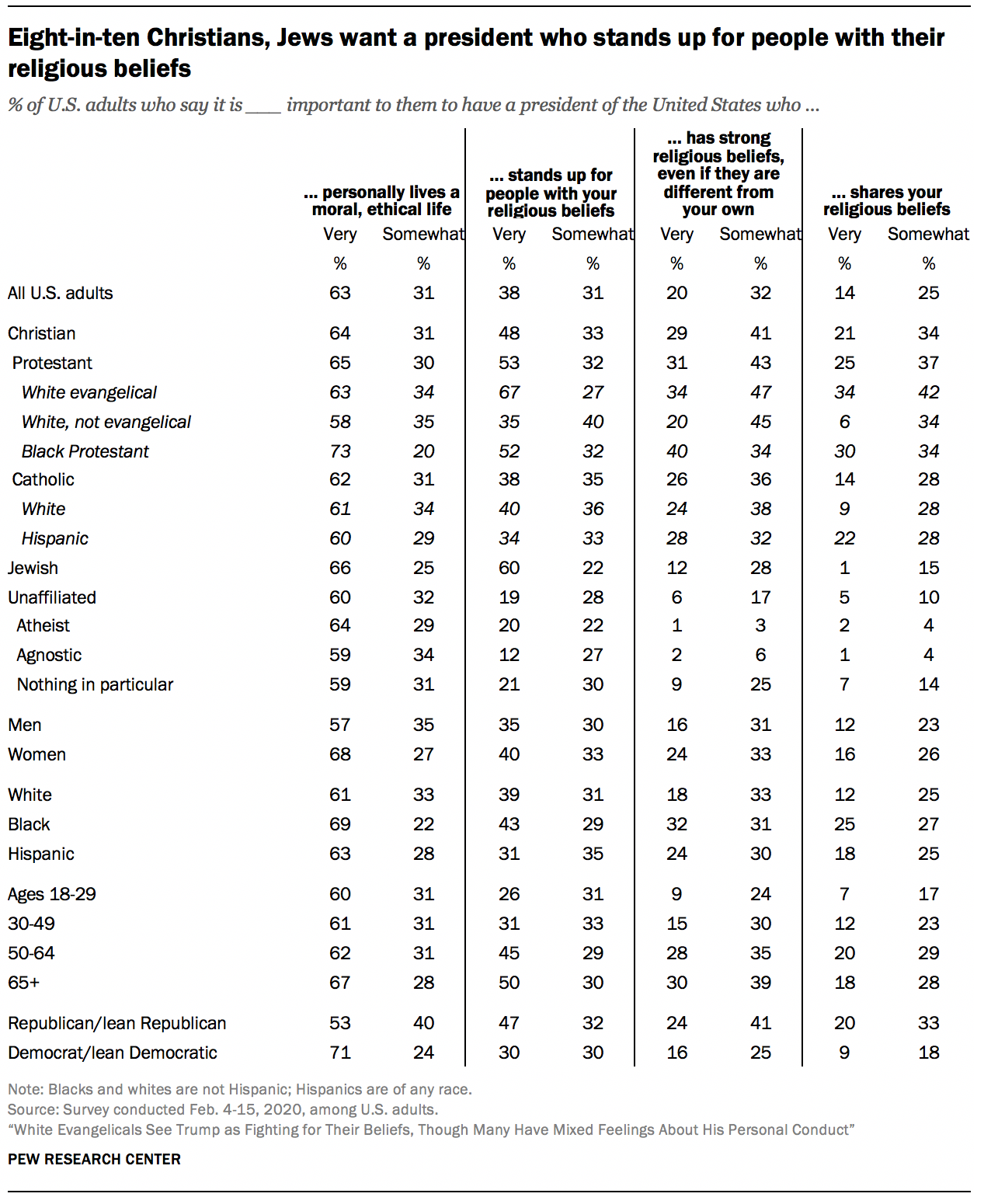
Most U.S. adults do not think Trump is religious, while seven-in-ten think Pence is at least ‘somewhat religious’
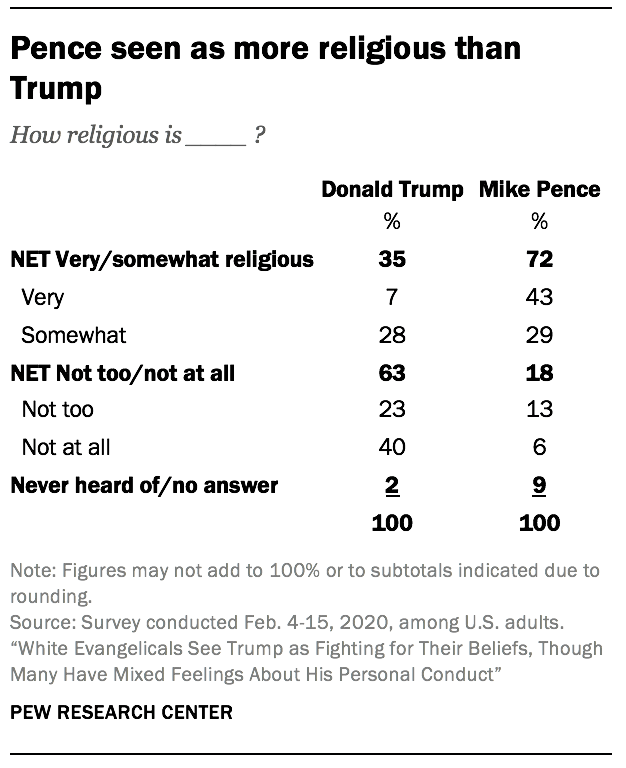
Most U.S. adults think President Trump is “not too” (23%) or “not at all” religious (40%). Roughly one-third consider Trump to be at least “somewhat” religious, including 7% who say he is “very” religious. By comparison, U.S. adults are about twice as likely to say Vice President Mike Pence is at least somewhat religious as they are to say the same about Trump. Seven-in-ten U.S. adults think Pence is very (43%) or somewhat (29%) religious, while just 18% say he is not too or not at all religious.
(The same survey shows that 55% of U.S. adults say Joe Biden is at least somewhat religious, while 35% view Bernie Sanders as at least somewhat religious. For additional details of how the public views the religiousness of Democratic presidential candidates, see “Most Americans don’t see Democratic candidates as very religious.”)
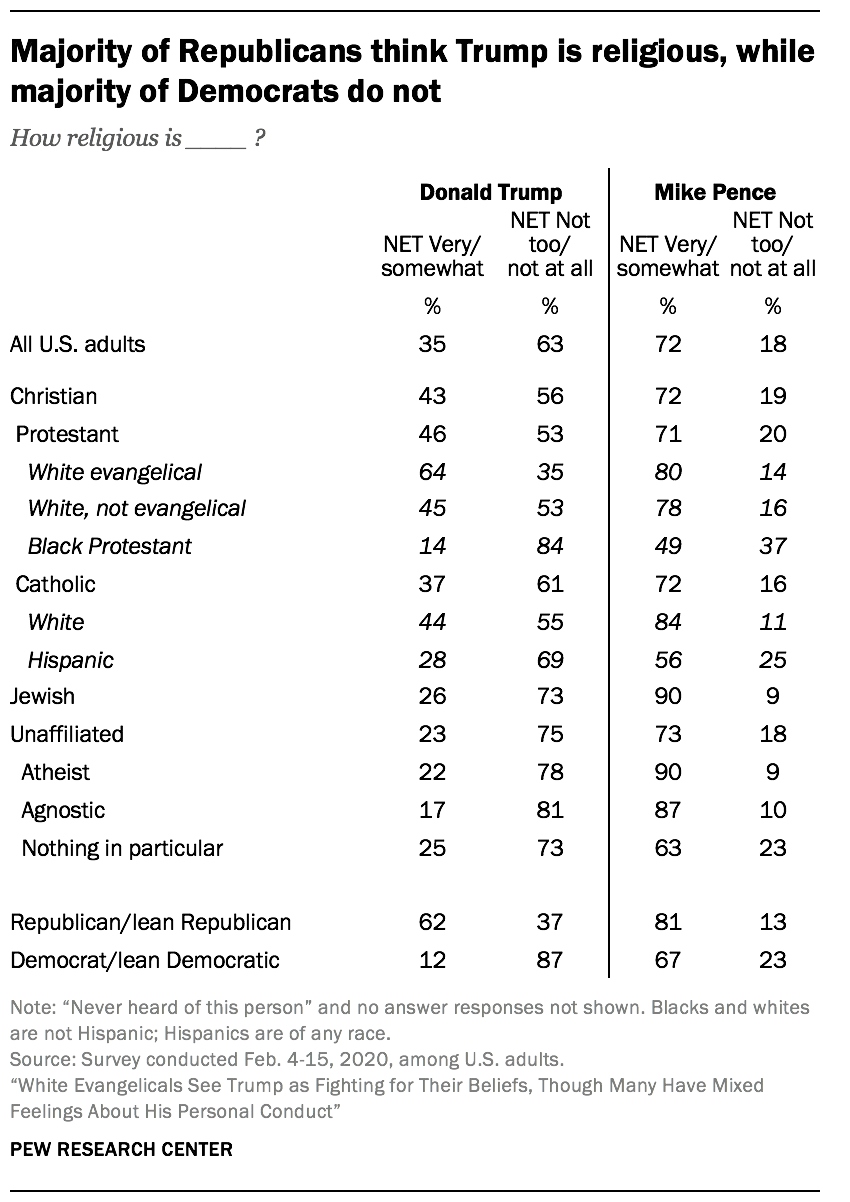
Members of most of the largest Christian traditions are more likely to say that Trump is not too or not at all religious than they are to say he is very or somewhat religious. The one exception is white evangelical Protestants. About two-thirds in this group say Trump is at least somewhat religious, while one-third think he is not very religious. By contrast, roughly three-quarters or more of Jews (73%), religious “nones” (75%) and black Protestants (84%) say Trump is not religious.
Like U.S. adults as a whole, people across a variety of religious groups – including white evangelicals – are more likely to say Mike Pence is religious than they are to say the same about Trump, with majorities in most religious groups saying Pence is at least somewhat religious.
Republicans and Democrats hold starkly different opinions about Trump’s religiousness. Republicans and those who lean toward the GOP are about five times as likely as their Democratic counterparts to say that Trump is at least somewhat religious (62% vs. 12%). Republicans also are more likely than Democrats to say Pence is very or somewhat religious, but the partisan divide on this question is much smaller, and majorities in both parties say they think Pence is at least somewhat religious.
Eight-in-ten U.S. adults describe Trump as self-centered, half say he is intelligent
The survey listed seven different potential traits, asking respondents whether each describes President Trump “very well,” “fairly well,” “not too well” or “not at all well.” The two negative traits were the ones most commonly ascribed to Trump, with eight-in-ten Americans saying “self-centered” describes him at least fairly well, and roughly six-in-ten saying “prejudiced” describes him at least fairly well. Even among white evangelical Protestants, some of Trump’s strongest supporters, seven-in-ten describe him as self-centered.
Still, white evangelical Protestants are the mostly likely to attribute several positive qualities to Trump. Majorities say “intelligent” (83%), “fights for what I believe in” (81%), “honest” (69%) and “morally upstanding” (61%) are at least fairly good descriptors of Trump. And only about one-third of white evangelical Protestants (35%) say “prejudiced” describes Trump very or fairly well, by far the lowest share who say this across the largest U.S. religious groups.
Other white Christians also express positive views of Trump. For example, roughly two-thirds of white Catholics and white Protestants who do not describe themselves as born-again or evangelical Christians say they think Trump is “intelligent” or “fights for what I believe in.”
Black Protestants, on the other hand, hold negative views of Trump, with about one-in-four or fewer saying any of the positive traits asked about in the survey describes Trump very or fairly well. Most black Protestants describe Trump as “self-centered” and “prejudiced.”
Religiously unaffiliated and Jewish Americans also see Trump negatively. Nearly nine-in-ten in each group say Trump is self-centered, and seven-in-ten say he is prejudiced. Far fewer say any of the positive traits in the survey describes Trump well.
Republicans and Democrats are sharply polarized in their opinions about which traits describe the president. For details see “Few Americans Express Positive Views of Trump’s Conduct in Office.”
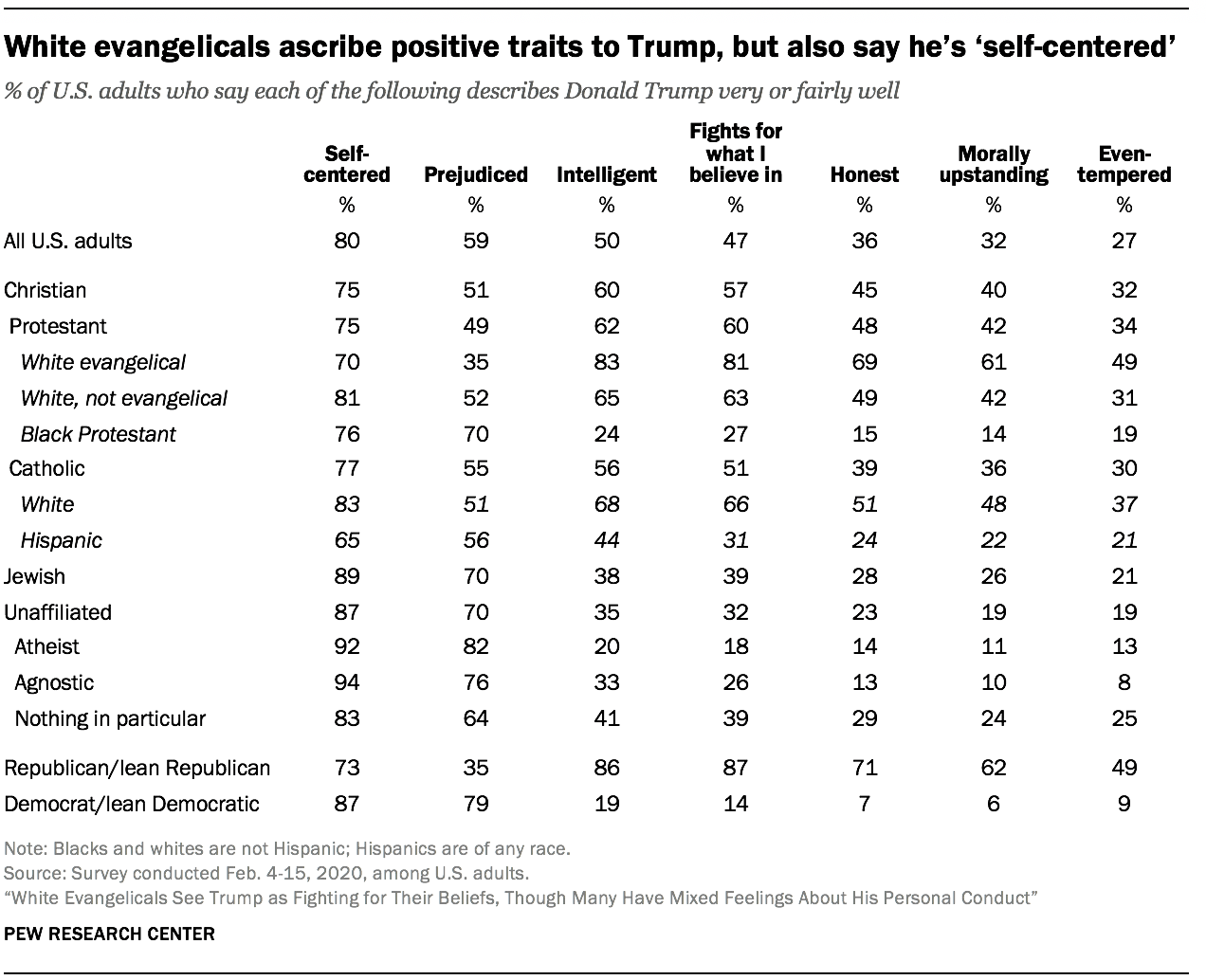
More than four-in-ten U.S. adults think the Trump administration has benefitted evangelical Christians, while about half say it has hurt Muslims
When asked whether the Trump administration has helped or hurt five different religious groups (Catholics, evangelical Christians, Jews, Muslims and people who are not religious), fewer than half of U.S. adults say the Trump administration has helped any of these groups. But Americans are more likely to say the Trump administration has helped the interests of evangelical Christians than they are to say this about the other groups. More than four-in-ten U.S. adults (43%) say the Trump administration has helped evangelical Christians, compared with fewer who say the same about Jews (29%), Catholics (25%), people who are not religious (14%) or Muslims (7%).
White evangelical Protestants tend to be more likely than others to see the Trump administration as beneficial to the religious groups asked about in the survey. For instance, 59% of white evangelical Protestants say the Trump administration has helped evangelical Christians. And a similar share of white evangelical Protestants say the Trump administration has helped Jews (57%). Jews, however, are more divided on this question: 40% say the Trump administration has helped their group’s interests, while 36% say the administration has hurt Jews.
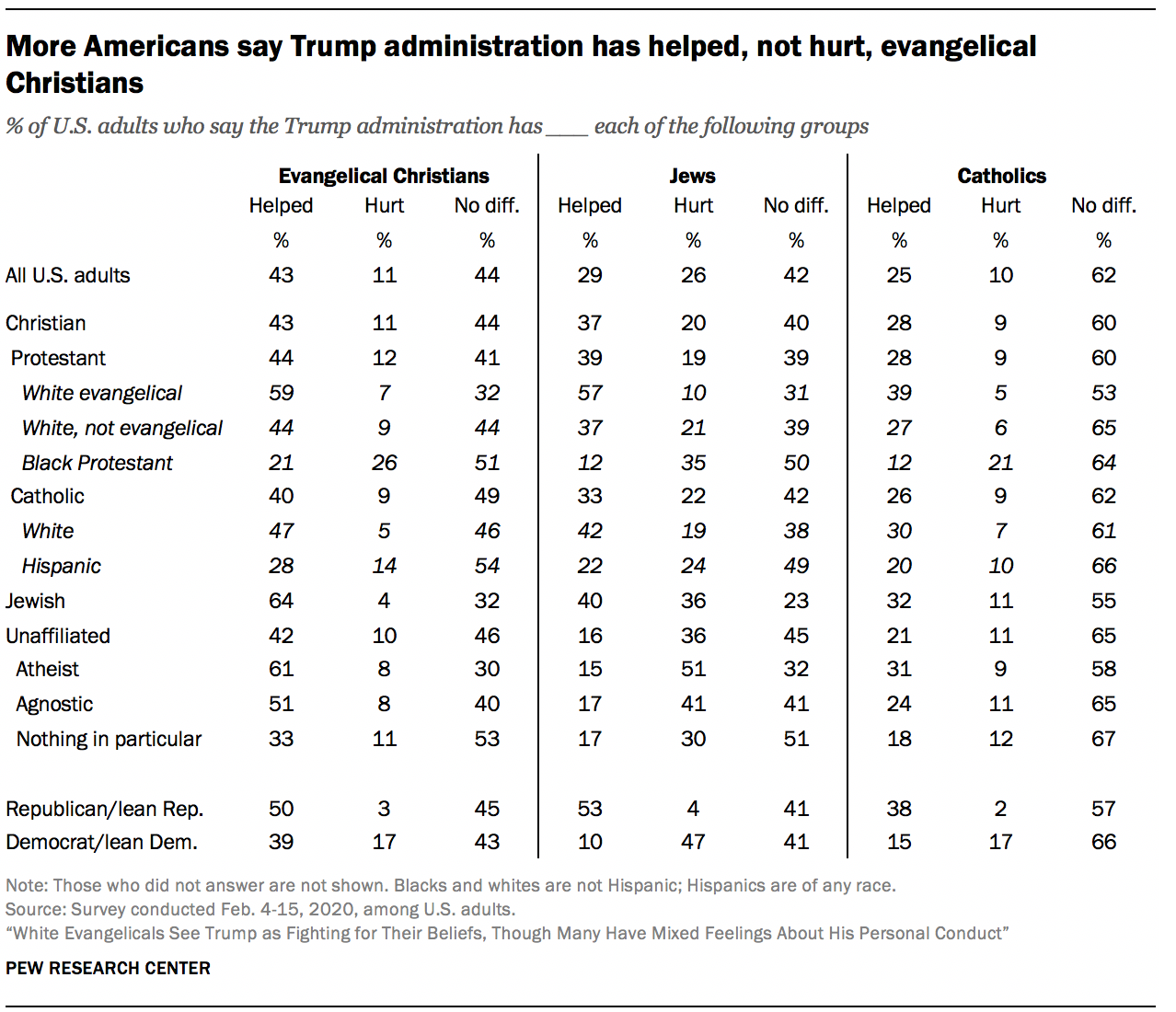
More Americans perceive the Trump administration as having hurt Muslims than any other religious group asked about in the survey. Roughly half of respondents (48%) say the Trump White House has hurt Muslims, while very few (7%) say it has helped the group. (While the full sample included Muslim respondents, there were not enough to analyze the views of Muslims separately.)
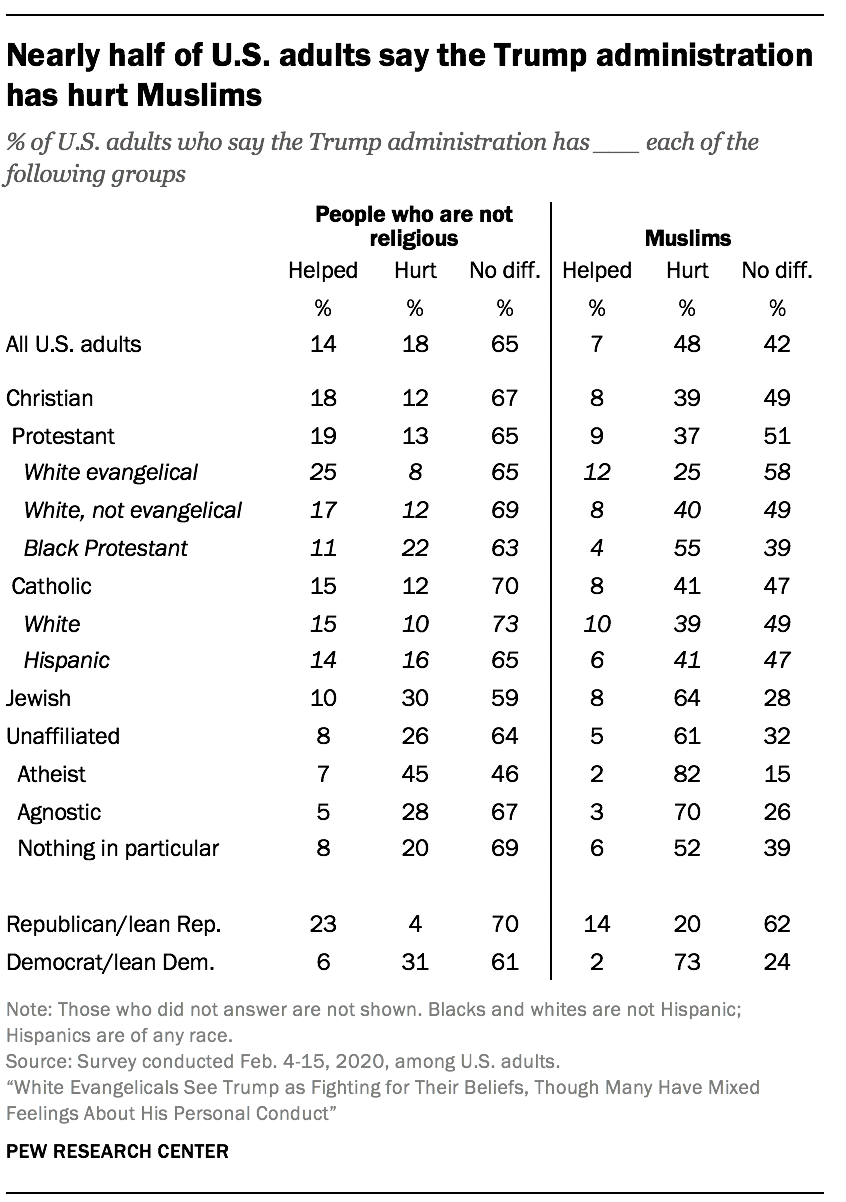
Two-thirds of Americans say the Trump administration has had little impact on the interests of people who are not religious. But 45% of self-described atheists think the Trump administration has hurt people who are not religious.
Republicans and Democrats differ in their opinions about the Trump administration’s influence on the five religious groups asked about in the survey. For example, more than half of Republicans think the Trump administration has helped Jews (53%), compared with 10% of Democrats who say this. And a large majority of Democrats (73%) say the Trump White House has been harmful to Muslims, compared with just one-in-five Republicans who agree.
Most white evangelicals agree with Trump on the issues, but fewer like the way he conducts himself as president
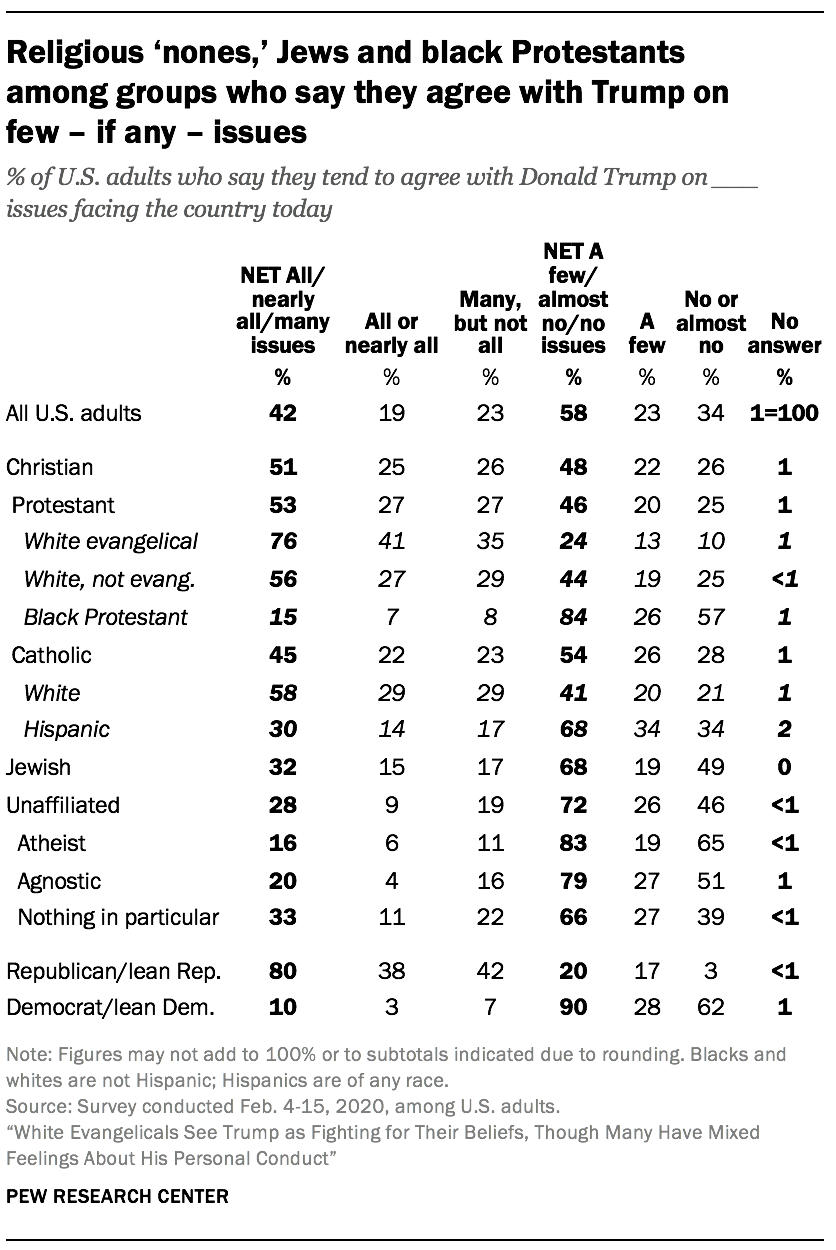
White evangelical Protestants are more likely than other U.S. religious groups to agree with Trump on the issues. About four-in-ten say they agree with Trump on “all” or “nearly all” issues facing the country (41%), and an additional one-third agree with him on “many” issues (35%). Most white Catholics and white Protestants who are not evangelical also say they agree with Trump on many, all or nearly all issues. At the other end of the spectrum, about half or more among Jews (49%), agnostics (51%), black Protestants (57%) and atheists (65%) say they agree with Trump on “no” or “almost no” issues.
There are massive gaps between Republicans and Democrats on this question. For details, see “Few Americans Express Positive Views of Trump’s Conduct in Office.”
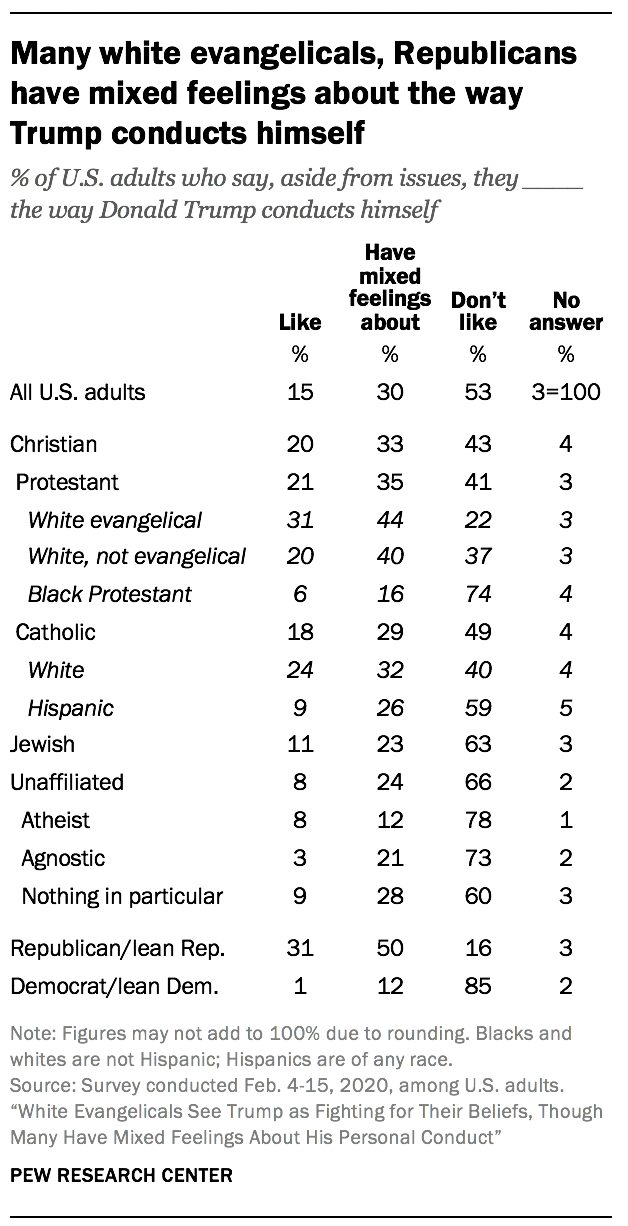
One-in-seven U.S. adults say that aside from the issues, they like the way Trump conducts himself (15%), while about half don’t like the way he conducts himself (53%) and three-in-ten express mixed feelings about Trump’s conduct as president.
Black Protestants, Jews and religiously unaffiliated adults are especially negative about Trump’s behavior: Six-in-ten or more in these groups say they do not like the way Trump conducts himself.
By comparison, white evangelical Protestants, white Protestants who are not evangelical and white Catholics are less negative in their assessments of Trump’s conduct. Most in these groups, however, stop short of endorsing Trump’s conduct; instead, many say they have mixed feelings about Trump’s conduct.